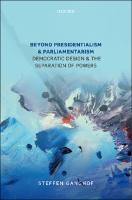Beyond Presidentialism and Parliamentarism
Democratic Design and the Separation of Powers
Abstract
In a democracy, a constitutional separation of powers between the executive and the assembly may be desirable, but the constitutional concentration of executive power in a single human being is not. The book defends this thesis and explores ‘semi-parliamentary government’ as an alternative to presidential government. Semi-parliamentarism avoids power concentration in one person by shifting the separation of powers into the democratic assembly. The executive becomes fused with only one part of the assembly, even though the other part has at least equal democratic legitimacy and robust veto power on ordinary legislation. The book identifies the Australian Commonwealth and Japan, as well as the Australian states of New South Wales, South Australia, Tasmania, Victoria, and Western Australia, as semi-parliamentary systems. Using data from 23 countries and 6 Australian states, it maps how parliamentary and semi-parliamentary systems balance competing visions of democracy; it analyzes patterns of electoral and party systems, cabinet formation, legislative coalition-building, and constitutional reforms; it systematically compares the semi-parliamentary and presidential separation of powers; and it develops new and innovative semi-parliamentary designs, some of which do not require two separate chambers.
Keywords
presidential government, parliamentary government, semi-parliamentary government, separation of powers, executive personalism, bicameralism, constitutional design, democratic theory, patterns of democracy, AustraliaDOI
10.1093/oso/9780192897145.001.0001ISBN
9780192897145Publisher
Oxford University PressPublisher website
https://global.oup.com/Publication date and place
Oxford, 2021Grantor
Classification
Comparative politics
Political structure and processes
Pages
224Public remark
Funder name: University of PotsdamMetrics
Measures
Timeline
Geographical
Information


 Download
Download Web Shop
Web Shop